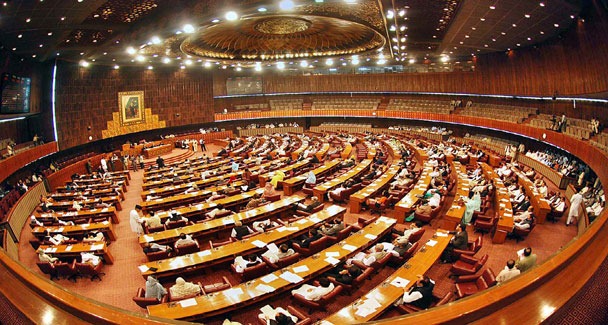
ISLAMABAD: The Senate Standing Committee on Human Rights has recommended an effective role of parliament in monitoring the Inter-Services Intelligence (ISI) agency and putting it under civilian control.
A report unanimously adopted by the committee was presented in the house on Wednesday but couldn’t be taken up for discussion because of opposition’s boycott of the session.
The committee unanimously approved on Sept 5 the recommendations which call for setting up a bicameral intelligence and security committee to suggest ways of addressing the issue of enforced disappearance of citizens. The report is a follow-up of resolutions unanimously endorsed by the Senate on March 7 and National Assembly on March 12 last year on the issue of enforced disappearances.
A parliamentary oversight of the ISI will be possible if the committee’s recommendations are included in a proposed Inter-Services Intelligence Agency (Functions, Powers and Regulation) Bill and if approved by parliament.Although on paper the ISI operates under the administrative control of the prime minister, civilian governments have in the past struggled to bring the agency under their control, but without success.
In last week of July 2008 the PPP government notified the interior ministry as the line department for the Intelligence Bureau and ISI, but had to backtrack within 24 hours when the military establishment expressed its displeasure.
The report calls for formation of a nine-member committee of parliament to examine matters relating to expenditure, administration and policy of the ISI. None of the members of the committee will be a minister.
Senator Farhatullah Babar of the PPP was the convener of the three-member committee which prepared the report. Nasreen Jalil of the MQM and Suraiya Amiruddin of the PPP were its members.
The prime minister will appoint members of the intelligence and security committee in consultation with the leaders of the opposition in both houses of parliament, the report suggests.
The committee will submit its annual report to the prime minister. It may also report to him at any time on any mater relating to its functions.
The prime minister will present to each house of parliament a copy of the report along with his observation whether a matter has been excluded form it.
Keeping in view the ISI’s role as a secrete agency, the Senate committee has suggested that the prime minister, in consultation with the committee, may exclude from the report any matter prejudicial to national security.
The committee will not go into the intelligence sources of the agency, but through policy decisions will guide it in carrying out its work.
The ISI director general has usually been a serving army general, but the first government of Benazir Bhutto brought in retired Gen Shamsur Rehman Kallu to head the agency. The military didn’t like the move.
Going one step forward, the committee has proposed the option of appointment of a retired civil servant of BS22 or equivalent rank in the armed forces by the president on the recommendation of the prime minister.
The ISI DG, according to the recommendations, will hold office for four years, extendable by another year, unless he resigns or is removed during his term on grounds of inefficiency, misconduct or physical or mental disability.
If approved by parliament, no director general would be able to get a full-term extension.
The DG will be responsible for efficient and effective direction and control of the agency. In particular, he will have full authority to direct and regulate all matters of recruitment, training, posting, transfer and promotion, discipline, allocation of duties, accounts and purchases. He will be the principal accounting officer and the chief executive officer, like any other federal government department.
His duties will include national security intelligence and the intelligence collection methods and to ensure that sources of and identities of members of the agency are protected from unauthorised disclosure.
In an important recommendation, the committee allows the DG to authorise in writing an official of the agency not below BS18 to enter any premises to look for an actionable piece of information.
The DG, according to the recommendations, should also have powers to authorise the arrest of a suspect working against the security, integrity or economic well-being of the country or being involved in planning, aiding, abetting or executing serious or organised crimes, or acts of terrorism. However, such an arrest should be made in the presence of a BS17 officer of the agency.
The DG may order preventive detention of a suspect for 30 to 90 days.
The detention may be extended beyond 90 days by a review board as explained in Article 10 of the constitution. The clause has been included to address the issue of missing persons. The DG has been provided indemnity in exercising his powers. The DG will be bound to submit an annual report on the functioning of the agency to the prime minister by March 31 each year.
To hear complaints against misuse of authority by ISI officials, the committee has proposed appointment of an ombudsman with adequate powers to call their role into question. The DG will be bound to assist the ombudsman’s office in this regard.
If a member of the agency is found guilty of wilful breach or neglect of any rule, the committee has recommended punishments ranging from three- to 27-year imprisonment along with fine.
Source: Dawn








